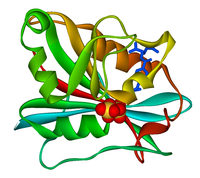
Photo from wikipedia
We discovered a series of azole antifungal compounds as effective antiprotozoal agents. They displayed promising inhibitory activities within the micromolar-submicromolar range against P. falciparum, L. donovani, and T. b. rhodesiense. Moreover, most of… Click to show full abstract
We discovered a series of azole antifungal compounds as effective antiprotozoal agents. They displayed promising inhibitory activities within the micromolar-submicromolar range against P. falciparum, L. donovani, and T. b. rhodesiense. Moreover, most of such compounds showed excellent nanomolar IC50 against T. cruzi, showing also very low cytotoxicity. Discussion of structure-activity relationships and biological data for these compounds are provided against the different parasites. To assess the mechanism of action against T. cruzi we proved that the most potent compounds (3b, 3j-l) inhibited the T. cruzi CYP51. Moreover, the most active derivative 3j dramatically reduced parasitemia in T. cruzi mouse model without acute toxicity.
Journal Title: European journal of medicinal chemistry
Year Published: 2018
Link to full text (if available)
Share on Social Media: Sign Up to like & get
recommendations!